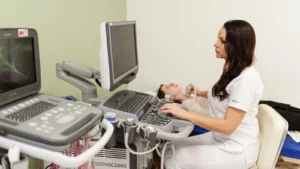
Are You Searching For An ARDMS Practice Exams?
Preparing for the ARDMS exam can be challenging. Finding the right ARDMS practice exams can
Home > What Does a Registered Vascular Specialist Do?

When you think about the circulatory system, usually, all we think about is the heart, but that is not the only thing. We also have a vast network of vessels that play a crucial role in keeping us healthy and alive, and that clean blood reaches every part of our body. These vessels, veins, and capillaries make up our vascular system, a highly complex and vital body part. When something goes wrong with our vascular system, a Registered Vascular Specialist (RVS) monitors and observes the system and makes sure it functions smoothly.
Before we go on about Registered Vascular Specialists and what they do, let’s take a quick look at our vascular health and what it is. You can think of your vascular system as a network of highways transporting blood to every corner of the body, delivering oxygen and nutrients while taking away the waste products. Since this network is so vast, it needs constant monitoring and care, and that’s where a Registered Vascular Specialist comes into the picture.
Now that we know what our vascular system is and what it does let’s take a look at the various vascular diseases that can affect it. Vascular diseases can range from conditions like peripheral artery disease, where arteries narrow and reduce the flow of blood to your limbs, to aneurysms that can be life-threatening. The symptoms of vascular diseases could range from subtle ones, like cramps, to severe, like a stroke. This means early detection and management are critical, and that’s exactly what a Registered Vascular Specialist, trained in vascular ultrasound registry review, does.
Don’t think of your Registered Vascular Specialist as just any healthcare provider, as they are the detectives of the medical world. They specialize in diagnosing and treating the various vascular diseases you can fall prey to. If you want to catch these diseases early, prevent any complications, and make sure your vascular system operates in an optimum condition, you have to go to a Registered Vascular Specialist.
Now that we know what a Registered Vascular Specialist is and what they do, let’s take a look at the various tools and technologies they use to do what they do. RVS specialists use a wide array of diagnostic tools like ultrasound and CT angiography to visualize the unseen and bring it in front of you. They don’t just deal with creating these images but also use them and interpret them with precision to identify issues that might have gone unnoticed.
If you want to become a Registered Vascular Specialist or are just curious, you must understand that the journey is tough and rigorous. Becoming a Registered Vascular Specialist involves the perfect balance of academic and practical training. First, you need a solid foundation in vascular sciences and then you need specialized training that will help you hone your skills to deal with the complexities of the vascular system.
After you finish your studies and have the technical training to go with it, the next and final step is the certification, which is a seal of approval. The certification lets everyone know you have become a specialist and have the expertise and commitment to the standards to deal with patients. It might sound easy, but if you are passionate about making your patients’ lives better, it’s well worth it.
When treating a patient, the very first step is a thorough assessment, where a registered vascular specialist shines.
The first step in any treatment is a thorough assessment, and that’s where a registered vascular specialist shines. They combine their expertise with state-of-the-art diagnostic tools to get a clear picture of what’s happening inside a patient’s vascular system. This meticulous evaluation is crucial for accurate diagnosis, which is the cornerstone of effective treatment.
Once they’ve made a diagnosis, the Registered Vascular Specialist starts creating a personalized treatment plan for the patient. This plan could include lifestyle changes and medication for more invasive procedures. They work closely with patients, guiding them through their treatment journey and adjusting plans as needed to ensure the best outcomes.
As we come close to the end, we now understand the vascular system, how it works, the various diseases, and the importance of a registered vascular specialist. When it comes to studying for the certification and acing it, there’s no better partner than Ocean Ultrasound. We have the latest and most up-to-date materials to help you reach the next level and prove yourself in your industry and beyond.
A Registered Vascular Specialist diagnoses and manages vascular diseases using advanced imaging techniques and personalized treatment plans.
By providing expert diagnosis, minimally invasive treatment options, and personalized care plans, a Registered Vascular Specialist can significantly enhance your vascular health and overall well-being.

Preparing for the ARDMS exam can be challenging. Finding the right ARDMS practice exams can

Preparing for the Echo Board Exam can be challenging. A good Echo Board Exam Review

Understanding the Pediatric Echo test is essential for parents and caregivers. This test, also known

So, you’re seriously thinking about taking the echocardiography certification exam? You have to know that
Subscribe our newsletter to get our latest update.
Copyright © 2024 | Ocean Ultrasound